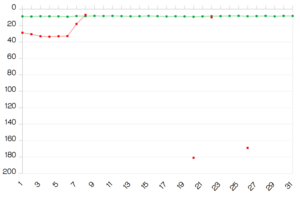How the free web fuels conspiracy theories.
Automated ad displays funds our free web helping the worst parts of the web become more popular.

Free web comes at a price
Automated advertising software has liberated the web: While in the past news outlets were directly selling their ad space to advertisers, today every content producer, every blogger can make money by using automated advertising software such as Google Ads to display ads on their website and, thus, make money with their online content.
However, we all know the saying "If it bleeds, it leads". This is not only true for traditional news agencies, but of course also for the world wide web. In fact, the web has become so perfectly optimized to the "If it bleeds, it leads"-mantra that it outperforms any traditional news outlet.
Free web fuels sensationalism
Google and Facebook, two of the most successful internet companies, have built most of their success by optimizing their algorithms in such a way that consumers of their products are increasingly being presented with increasingly sensationalist content through their feed to make users stay on their platforms for as long as possible.
The time a users spends on any free platform means money for this platform: The longer the user stays, the more ads can be displayed.
As a consequence, the free web fuels sensationalism. If serving dopamine is the only way to catch the attention of a bored brain, it is no surprise that the most successful online companies have optimized their feeds accordingly or that many bloggers focus on sensationalism. Just as in markets, where there is demand, supply follows.
The loudest wins
To many bloggers it does not matter that what they sell is misinformation. To them, the content is merely a product. Their primary goal is to be the center of attention for as long as possible. And that means being loud and controversial.
Content producers of sensationalist news have higher chances of making money with displaying automated ads than producers of neutral, fact-based content.
Sensationalism and conspiracy theories are the money makers of many online bloggers.
Boosted by social media
A lot of the conspiracy theorists' success has been boosted by social media as these platforms are perfectly optimized for sensationalist content. As said before, the more time a user spends on the platform, the more they can increase their ad revenue.
Even though some social media platforms are starting to ban conspiracy-related websites, e.g. QAnon related profiles are being banned from many social media platforms since the end of 2020, the conspiracy theorists always find other platforms to boost their content.
However, the platforms only ban the most extreme content. Misinformation and fake news are still widely shared. In fact fake news get much more attention than true news. An MIT study found on social media that "falsehood diffuses significantly farther, faster, deeper, and more broadly than the truth, in all categories of information, and in many cases by an order of magnitude".
Conspiracy theories and algorithms
The COVID19 pandemic has seen a skyrocket of misinformation around the world. This development, however, also put a lot of pressure on social media platforms that made them suspend accounts, delete hundreds of posts and videos, and add infoboxes to help users find reputable information. Google even announced that it would stop ads from running on stories spreading debunked coronavirus conspiracy theories.
However, up to that point "huge amounts of money has been split between the conspiracy theorists, the 'alternative' media and the tech giants themselves", as the Press Gazette reports.
On top of that, it always takes time until conspiracy theories get debunked, accounts get suspended or misinformation gets taken down.
In contrast to that, the underlying algorithms that are optimized for sensationalism support the spread of fake news and conspiracy theories.
As a result sensationalism and conspiracy theories have the upper hand. This is fueled by how the free web works, by how ad tracking and content optimization based on user profiles are influencing people and, thus, societies.
How ad tracking works
The price we all pay to enjoy a free web is ad tracking. By allowing websites to track every click we do online, we are being tracked, profiled and then targeted with matching content or ads. That's why we call on banning surveillance-based advertising.
This business model, called surveillance capitalism, does not only make you spend money on things that you might not need, it also lets the worst of the web keep growing.
Change the algorithms
To fix the web, we must change the algorithms. A web that is optimized for sensationalism will continue to help the spread of misinformation, fake news and conspiracy theories.
Even though we have lots of fact checking websites by now, it would be much better if web services simply did not optimize for sensationalism.
We need a new web where fake and misleading content is marked as such or removed entirely instantly.

No comments available










